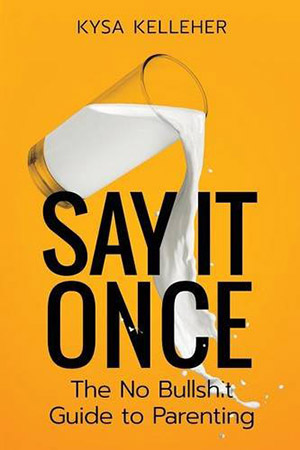Kysa Kelleher is not who you would expect to write a parenting guide. She doesn’t have lots of letters after her name that indicate advanced degrees in psychology or child development, although she does have a degree in nutrition. She’s not Jo Frost the Supernanny, with decades of experience in professional childcare, although she has had experience coaching high school athletics. In fact, Kelleher used to be a commodities trader at Enron and other companies, as well as owning a successful jewelry business – not jobs that typically involve childcare skills. But she does have six children (four at the time of writing the bulk of this book), and has managed to keep them all alive, thriving, healthy, contributing to the household, and she is still married to their father, so she is uniquely qualified to dispense parenting advice.
[alert variation=”alert-info”]Publisher: Inkwater Press
Formats: Paperback, Kindle
Purchase: Powell’s | Amazon | IndieBound[/alert]
In the first part of the book, Kelleher details her life pre- and post-kids, and how even her pre-kids experiences and jobs taught her useful parenting skills. Even her stop-and-start college career and her stint at Enron gave valuable lessons that she employed with her kids: let your kids find what inspires them to learn, let them fail, don’t shield them from life, and teach them to go after their dreams. The second part of the book is more of a parenting manual, covering a multitude of topics: how to feed your kids (this is especially salient information, owing to Kelleher’s nutrition degree), fostering independence, doling out punishments, not shaming or invalidating your children’s feelings, kids and cell phones, manners, money, and just about everything you could need to know as a parent or soon-to-be-parent.
Kelleher prefaces her book with a disclaimer: she’s not a writer, she claims to be “horrible at it,” grammar is not her thing, but she is writing a book because she wants to and feels she has something to say. This disclaimer wasn’t altogether necessary, as her writing is actually quite good, readable, and she gets her ideas across adeptly. Yes, she clearly writes the way she talks, but this style works for a no-nonsense parenting book. If her tone initially seems abrasive or know-it-all, keep reading, it improves as she goes along.
Sure, Kelleher and her husband at first come across as strict, intransigent, our-way-or-the-highway parents, and some of their tactics might seem a bit harsh. But as the book progresses, you will discover that they’re not mean parents, they care about their kids and are extremely compassionate towards them. They don’t shame the children, they don’t yell at them in front of others, and they don’t spank – which makes them much kinder than many parents you may have seen at the grocery store or the playground. Their kids have more freedom than many other kids in our culture have, but with that freedom comes more responsibility, and they lay everything out for their kids very clearly in a framework of rules.
It’s difficult to critique a parenting manual as personal as this, since this is clearly the method that works well for their particular family. There are many good ideas in this book that parents today could use: let your kids make decisions within reason, have even young kids do chores, empower children by showing them how to do things themselves, and Kelleher’s child-guided time-out method that she calls “have a seat.” As with any parenting manual, one doesn’t need to follow the whole book to the letter – every child is different, and while many of the ideas in the book could work for your children, not all of them will, and that’s okay. Kelleher’s book is geared more towards a multiple-child household, and of course she would know from experience how to keep a large household running like a well-oiled machine. But many of her tips and methods can also work for one- or two-child families. Her advice on stepchildren is also very sound.
With all of the complaints about kids these days being glued to screens, not knowing how to do things for themselves, and parental over-involvement, this book is a breath of fresh air, and one that many parents could really use to improve their lives. When Kelleher says, “don’t make your child’s life so easy that it makes your life difficult,” all parents should listen. In the end, Kelleher wants to help other parents, and her conversational style and normal-mom life encourage you to think that you can do what she does.
[signoff predefined=”Social Media Reminder” icon=”twitter”][/signoff]

